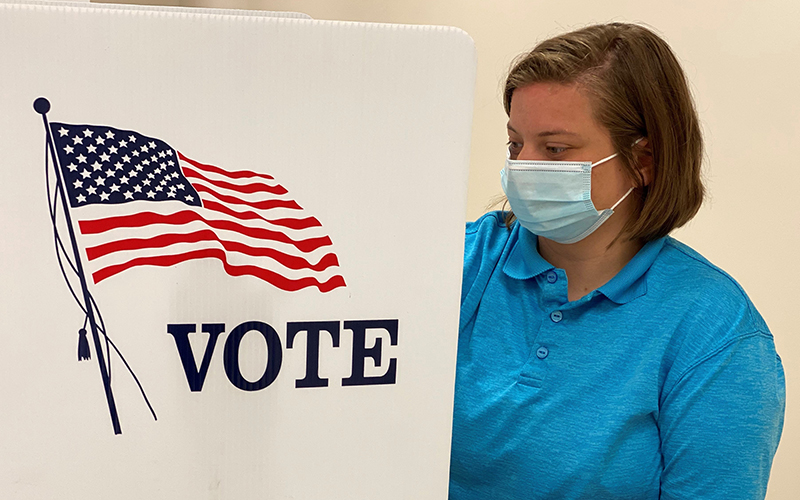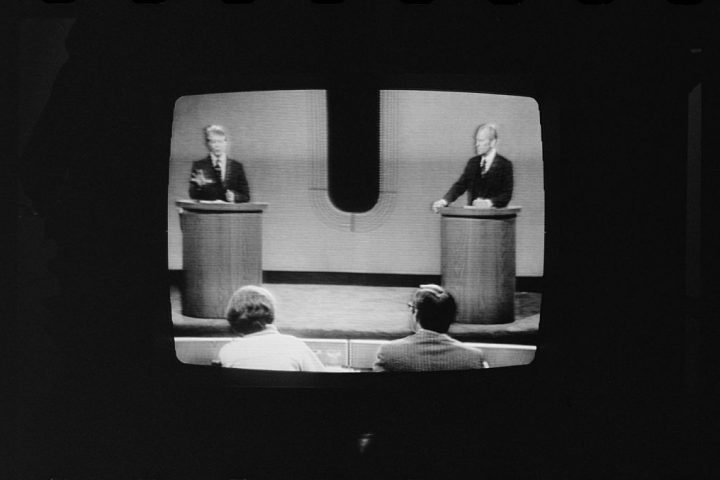|
Help |
Site Map
|
Doris O'Brien is a retired college Speech teacher and banker. She has published two books of humor (Up or Down With Women's Liberation and Humor Me a Little) and for many years contributed light verse to the Pepper 'n Salt column of the Wall Street Journal. She is an avid writer of letters to the editors.
Doris celebrated her 50th wedding anniversary in the same year she welcomed her first grandchild. She now lives in Pasadena with a great view of the San Gabriel mountains — and the annual Tournament of Roses Parade.
She can be reached by e-mail: witsendob at (@) gmail.com
In the 1950s, 90% of Americans lived in states that closed their registration rolls two or more weeks in advance of Election Day, a few as much as a year in advance. The situation today is better, but not commendably so. Most Americans live in states where, if you wait until less than two weeks remains in the election to try to register, you’re out of luck. Officials in states with early closing dates say that it’s necessary in order to prepare the paperwork in time for Election Day. In an earlier time, that claim made some sense. In the electronic age when the records are digitally kept and updated, it makes less sense. A dozen states smoothly manage to let their residents wait until the last minute. They allow residents to register when they go to the polls on Election Day. more »
Kenneth Winneg and Kathleen Hall Jamieson, American Behavioral Scientist, 2017: In this study, University of Pennsylvania researchers look at whether people gained knowledge about policy issues and changed their minds about the candidates after watching televised presidential debates in 2016. What the two scholars learned: While debate watchers gained knowledge about policies, their assessment of candidates’ qualifications did not change. Neither did their opinions of whether individual candidates, if elected, would threaten the well-being of the nation.
more »
Adding a justice opposed to abortion to the bench — which is what Trump has promised his supporters — would almost certainly tilt the court in favor of far more dramatic restrictions on the procedure and possibly an overturn of the landmark 1973 ruling Roe v. Wade. For Ginsburg, those issues came down to a clear question of a woman’s guarantee of equal status under the law. “Women, it is now acknowledged, have the talent, capacity, and right ‘to participate equally in the economic and social life of the Nation,’” she wrote in her dissent in that 2007 abortion case. “Their ability to realize their full potential, the Court recognized, is intimately connected to ‘their ability to control their reproductive lives.'” more »
Turning now to the labor market, unemployment was still at 8.4 percent in August and the labor force participation rate still down significantly from February. The extraordinary package of fiscal support in the CARES Act (Coronavirus Aid, Relief, and Economic Security Act) helped to support household incomes and to offset the effect of the huge job losses in March and April. But the act's unemployment provisions have expired, and most of the businesses that received Paycheck Protection Program (PPP) loans report that they have exhausted those funds.4 In addition, one area where increased understanding of the disease has, in many places, not led to general changes in practice is in the widespread school closures this fall. Many parents with children will be forced to work less, or not at all, which is going to be a hardship for them and weigh on the economy. So, I agree with Chair Powell that it will take continued support to sustain a robust recovery. more »
|
|
 Journalist’s Resource* Election Beat 2020: The Mysterious Voter Registration Deadline
Journalist’s Resource* Election Beat 2020: The Mysterious Voter Registration Deadline
 US Presidential Debates: Three Studies Journalists Should Know About (And The Public!)
US Presidential Debates: Three Studies Journalists Should Know About (And The Public!)
 Without Ginsburg, Judicial Threats to the ACA, Reproductive Rights Heighten: “Among other things, the Affordable Care Act now dangles from a thread”
Without Ginsburg, Judicial Threats to the ACA, Reproductive Rights Heighten: “Among other things, the Affordable Care Act now dangles from a thread”
 Federal Reserve: Optimism in the Time of COVID; Businesses Seem Much Better Adapted to Remaining Open
Federal Reserve: Optimism in the Time of COVID; Businesses Seem Much Better Adapted to Remaining Open






